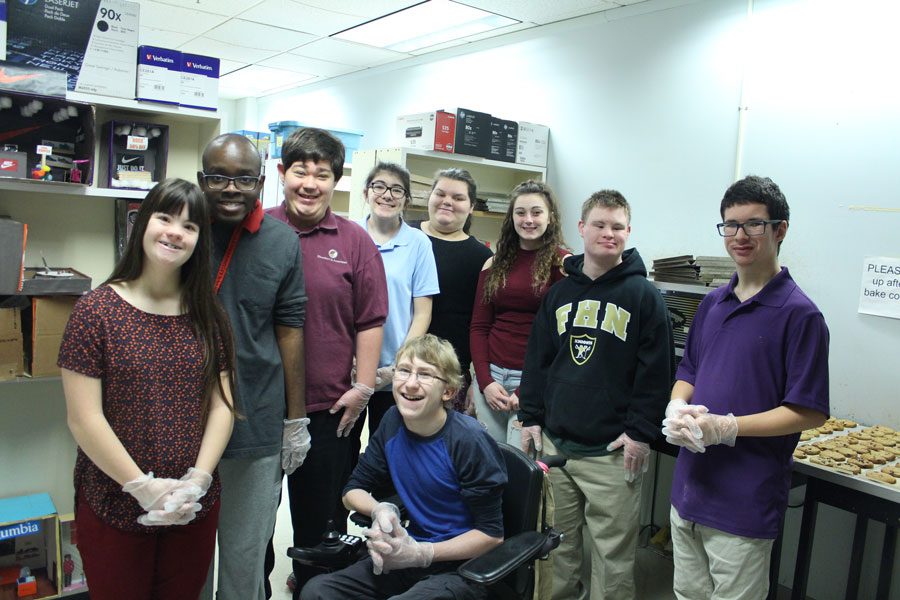Students with Special Needs Bake DECA Cookies
Credit to Jenny Blanchard
Some of the students involved in baking DECA cookies pose for a group photo.
Published: December 13, 2017
Their gloved hands scoop out the brown disks and set them on trays: 12 to a tray, eight trays of cookie dough. They move back and forth from the cardboard box of dough to the trays lying nearby. Their movements are smooth, creating their own beat. In this cramped room, they manage to maneuver around one another, never colliding. They’ve had practice.
It’s their morning ritual now, performed every day in the room next to Melissa Hanrahan’s. This time, it’s a Tuesday morning and while their classmates rush past to get to first hour, Maddie Rowe, Alex Connely and Eddie Wahwai are here to bake cookies.
They are just a few of the students in Juli Smith’s work experience class for students with special needs, which teamed up with DECA this year to bake their cookies every morning.
“Our students are performing a really important job because I know a lot of students rely on those cookies,” Smith said. “It shows how every student with special needs can be a part of the school community, the school culture.”
Smith and DECA co-sponsor Melissa Hanrahan came up with the idea two years ago. They spent the last couple years investigating FHC, which does the same thing, and figuring out the logistics. When would the students arrive in the morning? What jobs would they do? How would the students rotate? Finally, all the ingredients fell in place this year. It was time to turn on the ovens.
“I think it’s awesome,” Hanrahan said. “I’m just really thrilled that we’re able to do something where we’re connecting with others in our building – our own building – to be able to work with our DECA students, work with them and vice versa. I just think that it builds a sense of community here at North, and I think that’s what we’re striving for. Instead of just being known as the ‘Cookie Club,’ we wanted to do something a little different.”
DECA students lay out the trays every morning, and one of Smith’s students comes in at 7 to turn on the ovens. With everything prepared, three to four other students in the class go to the room next to Hanrahan’s to bake every day in first hour. A new group takes a turn every two to three weeks.
“Every morning, there is a group of kids learning skills and on-the-job training – basically, it’s kind of like a work program for them here in our building – and they’re providing these for you every day,” Hanrahan said. “They do a great job.”
Hanrahan and Smith plan to bring these students into DECA in the future. They hope to make them full DECA members next year, and Hanrahan wants them to help run district-level competitions the year after that.
“It’s amazing,” Hanrahan said. “Knowing that we are partnered up with those kiddos makes it even more exciting – that we’re giving back, they’re giving to us, I mean it’s just a win-win for everybody involved. I think that it just builds even more of a sense of community with our DECA students.”
Besides this sense of community, Hanrahan has noticed other changes: cookie sales are up, waste levels are down and inventory updates are more timely.
“The reliability that we’ve had this year – by far, amazing,” Hanrahan said.
They’ll be back tomorrow. And the day after that. They’ll take the cookies out of the box, put them on trays – 12 per tray, exactly 12 – and slide them in the ovens. Ready to sell. Ready to eat. Ready to do it all again tomorrow.
“It makes me feel good because I see the students building confidence in a skill,” Smith said. “I see them being a part of the school community. Everyone knows about the cookies being sold downstairs through DECA, but I don’t know if everyone knows that our students help bake those.”






![2025 Graduation [Photo Gallery]](https://FHNtoday.com/wp-content/uploads/2025/06/Patel_Grad-11-300x200.jpg)







Allison Egley • Dec 15, 2017 at 10:34 pm
Oh my goodness. I LOVE this! As an FHN alumnus who now works for Vocational Rehabilitation, helping individuals with disabilities find and maintain employment, I can’t think of a better training ground for these students. Why to go FHN!